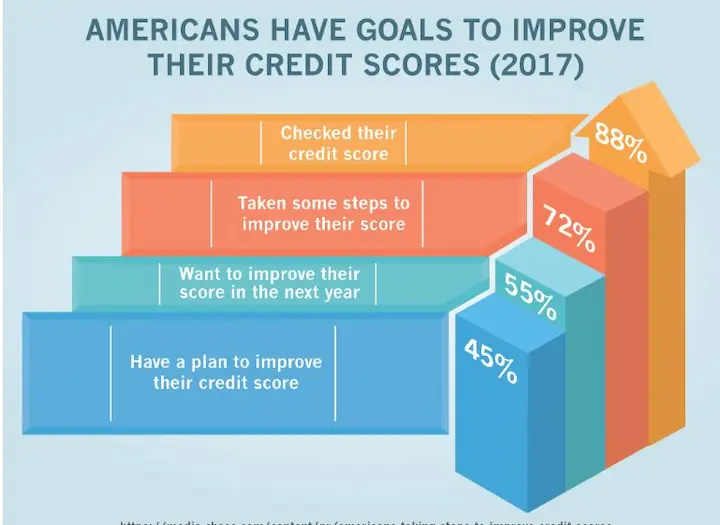You have a couple of bills, decided to take out the same number of loans, and are accountable with the same credit cards, but your credit score fluctuates monthly. It may appear that your credit score is fluctuating up and down with the seasons, even though you haven’t made any effort to influence it.
This article will cover aspects that could affect your credit and explain why your credit score has decreased.
The Importance of Your Credit Score
Lenders utilize credit scores to assess the likelihood that you will repay the loan you take out. It is essential when purchasing a house and plays a significant role in determining the rate and conditions for your loan.
Credit reporting bureaus base your credit score on your history of payments, the amount you have to pay, the length of your credit history, the kind of credit you hold, and the type of credit you recently added. Therefore, a change in your score indicates something has changed in one of these.
Why Did My Credit Score Drop When There Wasn’t Any Change?
Sometimes your score may alter due to circumstances outside of your control. However, most of the time, your actions affect scores in ways that might not be apparent.
Let’s look at the elements that affect your score and some reasons for how it could change, even without evidence that you’ve changed your behavior.
Your Credit Utilization Has Changed
Your credit utilization rate ratio measures the sum you are liable for to your credit card concerning the credit limit. It can affect your credit score, and any change in one of these ratios can affect your credit score or cause a drop in credit score.
Have you been charged more on your credit card balance recently? If yes, your credit utilization could have increased, adversely affecting your credit score. In general, having less than 30% credit usage (i.e., spending $300 or less when the maximum is $1000) will help keep your credit in good condition. Furthermore, having multiple credit card accounts may also influence your credit utilization rate, so managing them well is essential.
Find out whether the credit card issuer has reduced or increased the amount you can use. It’s common for credit firms to inform you’re eligible for an increase or decrease in credit limit. Suppose your expenditure habits were the same, the increase in your credit limit reduction action ratio. A credit limit reduction could increase your utilization ratio, which decreases your credit score. It might also lead to Credit card debt.
Something Was Noted on Your Credit Report
Reminisce about your payment past – did you miss the credit card payment in the past couple of months? Did you pay any bills you could have missed in the past?
Late payments are usually not reported to credit reporting agencies until 30 days late, so your score will be affected the day after. Late payments can affect your credit score, especially if they are more than 30 days overdue. Delinquency, when a payment is more than 30 days late, can significantly harm your credit score.
Derogatory marks, such as charge-offs, tax lien foreclosures, collections, or bankruptcy, can significantly impact your credit. If you’ve been through one or all of them, your score could take some time to alter due to the negative impact. It could take weeks or even months to appear on your credit report.
Something Slipped Off Your Credit Report.
Fortunately, late payments or derogatory marks will only remain on your credit report for a short time. The more time passes since the pattern to the credit scores, the lower negative impact they’ll have on your score, and you could see your score increase over time as your conduct remains consistent.
Late payments for more than 30 days stay on the credit report for seven years. However, derogatory marks such as bankruptcy could be on your credit report until ten years. As time passes, your score will improve. When the effects disappear from your credit file, you could see a rapid increase in your score, thanks to the reduced negative impact.
There’s Been a Recent Investigation Concerning Your Report.
The company may have checked the credit report if you’ve recently applied for a credit card application or loan. Reporting bureaus consider them as hard inquiries or credit check. It happens when a lender scrutinizes your credit, considering your credit inquiries, to determine whether they’d like to lend money. It can temporarily lower your credit score, as determined by credit scoring models.
An Account Has been Closed
Fully paying off your loan may hurt your credit score because your credit history will get short, and approximately 10 percent of your score depends on the age of your credit accounts. If you’ve completed the repayment of a loan over the last few months, you could see your score drop.
Closing a credit card application may also adversely affect your credit score. Your credit score will decrease, and you will have fewer loan options due to your negative credit history, reduced credit limit, and high credit utilization ratio.
Most of the time, you’ll be in charge of approving a credit card to shut down. However, credit card company can close accounts without your knowledge. The Equal Credit Opportunity Act (ECOA) allows creditors to shut down a credit card for inactivity, delinquency, or default without giving notice. If a credit card company decides to close an account for another reason, they’re only required to provide you with 30 days before closing the account. It means you could end up with an unpaid credit card you’re unaware of as a result of the actions of the credit card company.
Do You Need to Worry About Your Credit Score Slipping?
The changes in your credit score are perfectly normal, and there’s no reason to fret about minor changes! It’s best to review your credit report every month to keep track of the changes that occur.
It is possible to be aware of significant fluctuations in your score since they could indicate that something more serious is taking place, like when you have accounts that aren’t yours that you have opened under your name or you’ve been the victim of identity theft.

Things to Consider When Your Credit Score Changes
When your credit score is changing, take a look at the following questions:
- Have you checked your credit mix? A diverse credit mix can positively impact your score, while having only one type of credit may limit your score’s potential.
- Have you recently requested credit reports from the major credit bureaus? It’s important to review your reports regularly to catch any potential credit report mistakes that could negatively affect your score.
- Are there any recent changes in your credit accounts or applications that could cause fluctuations in your score? Monitor your credit and be aware of any changes impacting your overall health.
- Did you spend more or less this month compared to prior months? If yes, your credit utilization ratio might have changed.
- Have you missed a payment over the past couple of months? If so, it could be a delinquent account hurting your credit score.
- Did a late payment or negative mark spot disappear from your credit report several years ago? If yes, then your credit score might be going upward.
- Did you apply for credit? An inquiry might have been filed on your report that could negatively affect it.
- Have you recently paid off a loan or canceled a credit card? If so, your credit history might be affected.
If you look closer, some changes may impact your credit score, something you didn’t know about at first. The best way to keep track of the changes to your credit score is to examine your credit report every month to ensure that you know every aspect that impacts your score.
Frequently Asked Questions About Why Your Credit Score is Sinking
What Impact Does the Most Have on the Quality of Your Credit Score?
Many factors can affect your credit score. Your payment history can account for 35 percent of your FICO(r) score. Creditors are looking to determine whether you’ve made punctual payments to previous credit loans or accounts; your payment history is usually the primary indication. Auto loans, student loans, and other credit products can significantly impact your credit score through on-time monthly payments or late payments.
What Constitutes a Low Credit Score? Credit Score?
What is considered an excellent high or the lowest credit score is contingent on your or the credit bureau’s scoring model.
VantageScore is a VantageScore(r) method built on an interval of 300 to 800, and anything lower than 661 is “bad.”
The FICO(r) model uses the 280-850 range. 850 as the range, with “bad” scores measuring below 670.
Most lenders will look at your FICO(r) score when evaluating your loan approval, whether for an auto loan, student loan, or other credit products. On-time monthly payments play an essential role in achieving a good credit score.
What Is the Amount My Credit Score Will Improve if I Remove a Negative Charge?
It will depend upon your negative element or derogatory mark and whether it’s due to a late payment. An unfavorable item could affect the credit score for seven years, even after removing it. The most crucial option to restore your credit score is to improve your credit to a higher level. One way to do this is by considering personal loans or lines of credit to help rebuild your credit history.
The Bottom Line
It’s depressing to watch your credit score fall. You should monitor your credit score using credit monitoring services. It is especially crucial if you take out a loan or mortgage. Remember that the information gathered from national credit bureaus affects your credit score. You can better manage and improve your overall credit standing by staying informed.

